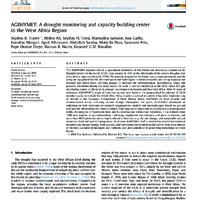Recherche
2 items
AGRHYMET: Adrought monitoring and capacity building center in the West Africa Region
The AGRHYMET Regional Center, a specialized institution of the Permanent Interstates Committee for Drought Control in the Sahel (CILSS), was created in 1974 at the aftermaths of the severe droughts that affected this region in the early 1970s. The mission assigned to the Center was to train personnel, provide adequate equipment for the meteorological and hydrological stations networks, and set up regional and national multidisciplinary working groups to monitor the meteorological, hydrological, crops and pastures conditions during the rainy season. As such, it can be considered as the West Africa drought monitoring center, similarly to its younger counterparts in Eastern and Southern Africa. After 40 years of existence, AGRHYMET’s scope of activities expend now beyond the geographical boundaries of CILSS member states, to include the whole West Africa thanks to several initiatives it has been implementing on behalf of the Economic Commission of West African States (ECOWAS) on food security and environmental issues, including climate change. Throughout the years, AGRHYMET developed, in collaboration with international research organizations, models and methodologies based on ground and satellite observations to monitor rainfall, food crop water requirements satisfaction and prospective yields, the progress of vegetation front and its seasonal and interannual variations. It has trained about 1200 new experts in agrometeorology, hydrology, equipment maintenance, and plant protection, and more than 6000 professionals on topics related to food security, climate change, and sustainable natural resources (land and water) management. As of now, AGRHYMET staff is involved in several international initiatives on climate change, food security, and environmental monitoring that allow them keep abreast of the best available technologies and methods, and also contribute to generating knowledge on those issues.
Projet MESA, du satellite à la gestion des parcours
Le Projet MESA a pour objectif global d’améliorer les capacités des structures régionales et nationales impliquées dans la gestion de l’environnement, le climat et la sécurité alimentaire dans la zone CEDEAO, plus la Mauritanie et le Tchad, à utiliser l’information issue de l’observation de la terre pour la prise de décision et la planification. Les objectifs spécifiques de la THEMA-CEDEAO sont les suivants:
1. Assurer un accès amélioré et durable des acteurs aux niveaux régional et national aux données d'OT en capitalisant sur les résultats du projet AMESD ;
2. Rendre disponibles les données d'OT et les services améliorés d'information contribuant à une meilleure prise de décision et une meilleure planification;
3. Contribuer à la fertilisation mutuelle en matière de technologie d’Observation de la Terre au niveau continental et dans les institutions régionales et nationales ;
4. Renforcer les cadres de développement de politiques ;
5. Renforcer les capacités des acteurs aux niveaux régional et national en matière d'information relative à l’OT (les sources, les utilisations, les limites, les implications politiques, etc).

